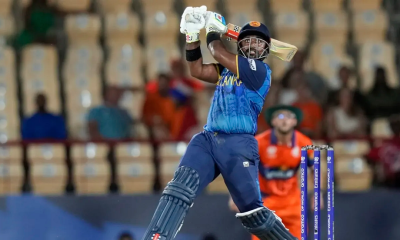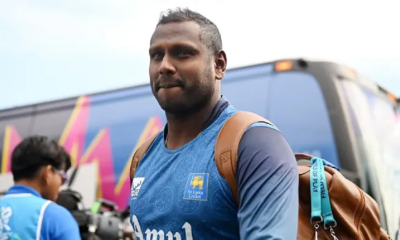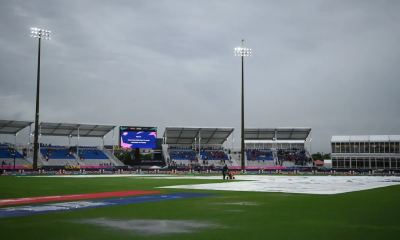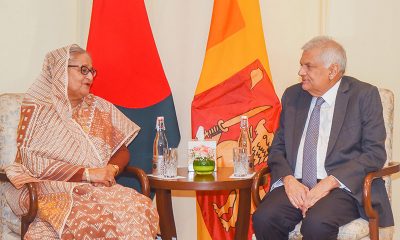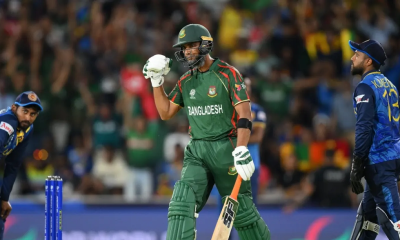Opinion
Deadly bans, opposition blind spots and Dullas-GL group as factor
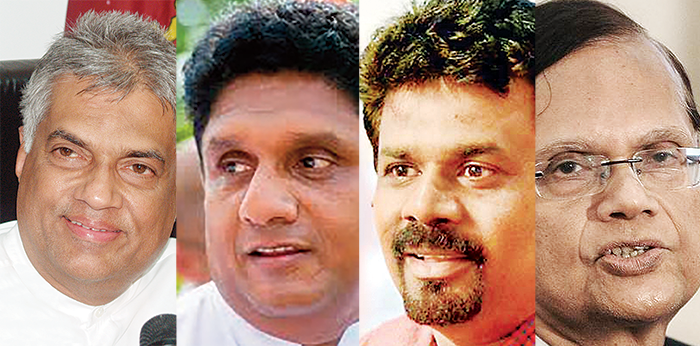
By DR. DAYAN JAYATILLEKA
When President Ranil Wickremesinghe’s administration engaged in a ‘shock ban’ of a large number of items, I expected the Opposition’s economists to do exactly what they did when President Gotabaya Rajapaksa and Dr PB Jayasundara did the same thing. That is, to denounce it to the high heavens, demanding “BUILD BRIDGES, NOT WALLS!” But no, when Ranil does what Gotabaya did, there is a deafening silence from the same quarters.
Ranil’s ban and the Opposition’s silence are especially dangerous because the items listed include material vital for the maintenance of our railways which are used by large numbers of commuters. The banned items include rail air brakes, fire fighting vehicles, rail locomotives, railway signaling equipment, railway coaches, wooden railway sleepers, safety headgear, steam turbines, boilers, diesel engines.In the absence of these items, the already depleted railway system could begin to malfunction even more than it currently does, leading to the most horrendous accidents, causing large numbers of deaths and maiming.
Come to think of it, that may be an opportunity to make a case for privatizing the railways and selling them off to local or foreign “investors”.
Maybe that’s why the ‘Economic Ranilists’ in politics and civil society are not voicing opposition to the ban?
Ranil’s ban includes many items necessary for the maintenance of industrial plant and infrastructure, agriculture, and production of goods and services locally: Machinery for making paper or paper board, book sewing machines, printing machines, lathes, weaving machines (looms), knitting machines, ploughs, harvesting machines, dairy machinery, poultry incubators, machinery for preparing animal feed, machinery for cleaning, sorting or grading seeds, duplicating machines, machinery for the extraction or preparing of animal or ‘fixed’ vegetable fats or oils, gaskets, safety headgear, boilers, ship cranes, fork lift trucks, hoses, gas and water gas generators.
Industries of all sorts from manufacturing to dairy and poultry, and even agriculture could collapse due to these items being banned. Here too, if these do collapse, one supposes that foreigners could be asked to set up in those sectors! Hence the silence from the usual suspects, the free-market fundamentalists.
SJB SELF-TRAPPED
The Opposition as it stands is caught in a self-designed trap. The trap wasn’t designed by Ranil Wickremesinghe but it has been triggered by him and the Opposition has still to extricate itself.The main Opposition party the SJB is trapped by the declared statement of its designated economic troika that they endorse and support President Ranil Wickremesinghe’s economic policy doctrine.
In the context of a deep economic crisis, if the economic policy-makers of the Opposition support in the main, the economic policy of the ruler, an economic policy that will cause tremendous hardship, then there is a severe limitation on the capacity of the SJB to oppose the government. This is a completely unnecessary dilemma, given that the SJB has as an asset of inestimable value, the economic policy doctrine, model and example of President Ranasinghe Premadasa, a proven success story in rescuing the country and rapidly growing its economy.
It is now increasingly evident that the SJB contains two tendencies: those who regard Ranasinghe Premadasa as a greater inspiration than Ranil Wickremesinghe and those who regard Ranil and the late Mangala Samaraweera as greater than Ranasinghe Premadasa. The former regard Sajith Premadasa as their only leader, while the latter seem to have a two-tier loyalty structure in which their immediate, temporary leader is Sajith but their Supreme Leader is Ranil.
Dr Ravi Rannan-Eliya’s IHP/SLOTS tracker data clearly shows that the erosion of SJB votes and their switch to the JVP-JJB is traceable to the loss of the Nov 2019 Sajith Premadasa presidential election vote-base, which in turn is due to the pivot from his (Ranasinghe Premadasa-ist) ‘developmental-populism’ to a policy discourse heavily weighted towards the neoliberalism of his economic policy troika.What is noteworthy is that the first ‘Premadasa-ist’ tendency does not comprise of leftists from outside the UNP, but precisely those like Imtiaz Bakeer Markar, a second generation UNPer. The second, ‘Ranilist’ tendency consists of those whose UNP experience is solely limited to the disastrous Ranil quarter-century with its neoliberal ideology, but were also minions of Ranil during one or both of his stints as PM (2001-2003, 2015-2019).
JVP-JJB JAMMED-UP?
The other important component of the Opposition—now perhaps the leading component—is the Left, consisting of the JVP-JJB and the FSP. Though in terms of parliamentary politics, we could simply limit it to the JVP-JJB, the main weakness is common to the Lankan Left as a whole. It is the absence of a declared, credible macro-economic alternative, fronted or backed by economists of mainstream repute.
This again is an unnecessary weakness and is easily bridgeable, because the first economist I heard focusing on the debt crisis and its effects on the economy as a whole– and this was many years ago, to an audience which included Mahinda Rajapaksa, who chaired most of the day-long meeting, was Prof Sumanasiri Liyanage, Sri Lanka’s most notable Marxist economist (not counting Prof Howard Nicholas)! Prof Sumanasiri Liyanage and Dr. Ahilan Kadirgamar could easily chart a progressive, pro-people path out of the crisis, but I have yet to see the Left produce a policy plan co-authored and signed by them.
There are two further weaknesses of the JVP-JJB which could cost them everything they have built so far. One is the refusal to entertain the idea of a united front, even in the face of Pohottuwa officials naming at media briefings, Anura Kumara Dissanayaka and Sunil Handunetti (JVP-JJB), as well as Kumara Gunaratnam (FSP), as conspiring to overthrow the democratic system by extra-constitutional means. The net of repression is beginning to descend on both parties but only the FSP has called for two united fronts: a political united front of all democratic parties, and a workers united front against privatization and cutbacks.
The third weakness, is that the JVP-JJB while very correctly campaigning for an early parliamentary election, avoids the elephant in the room: even if it wins such an election, which is possible, even likely, the President, Defence Minister and Commander-in-Chief will remain Ranil Wickremesinghe who will have no hesitation whatsoever in signaling Secretary/Defence (Retd) General Kamal Gunaratna to use live ammunition against demonstrations, however colossal they may be. The JVP-JJB must logically call for a snap president election as well, but it fails to do so.
SLFP, 10-PARTY SUICIDE
The third space in the Opposition consists of the Centrist and Center-Left currents. At the moment, these are the SLFP and the 9-party group (the Union of Independent Parties). The first is led by President Maithripala Sirisena and the second, which should have been led by Vasudeva Nanayakkara, is headed by Wimal Weerawansa.
Both these currents have lost their way. While Maithripala Sirisena often strikes the correct note, speaking with the benefit of experience, the SLFP contains several personalities who are in their track shoes awaiting to make a running-jump into President Ranil’s administration. There are a few free-floating individuals like Chaminda Weerakkody and Anura Priyadarshana Yapa, who are pretty good on policy issues but are of no fixed political abode.
As for the 9 -or 10 party grouping, it blotted its copybook by voting for the Emergency and has followed it up with the Weerawansa party’s vicious attacks on the Aragalaya and support for “investigation into the conspiracy”. This is the same bitterness with which the Old Left denounced Wijeweera’s JVP as a “CIA conspiracy” and cold lack of sympathy or empathy it displayed towards the youth uprising of April 1971, the brutality of the suppression of which completely undermined the moral legitimacy of the United Front Government and decimated the Left electorally in 1977.
This ‘Union of Independent Parties’ seems ideologically closer to Prime Minister Dinesh Gunawardena than to anyone else. Given that the PM is part of the Rajapaksa bloc which is propping up and being propped up by President Ranil Wickremesinghe, the traditional adversary of the center-left, I see no electoral future for the Wimal-led ‘union’.
DULLAS-GL GROUP
There is however, hope for the important Center-left space and tradition in the island’s politics. A new entity seems to be struggling to be born. That is the Dullas Alahapperuma-GL Peiris group of ‘SLPP Reformists’. It has several strengths, some of which are manifest, others, potential.
· It is bigger than a splinter group in parliamentary numbers, running as it does into double-digits.
· It’s personalities have national name-recognition. It is not a one-man show.
· It’s collective brain-power as manifested in academic and professional credentials — starting with Prof GL Peiris–arguably exceeds that of any other formation in Parliament. Dr. Charitha Herath and Dr. Nalaka Godahewa can match anyone in a substantive policy debate. To produce a realistic economic rescue package/roadmap and negotiate with the IMF, I’d bet on GL-Charitha-Nalaka over Harsha-Eran-Kabir on any given day.
· Dullas Alahapperuma, a prominent SLPPer whose house was not burned on May 9th, is a parliamentarian of rare civility and integrity, whose progressive ideological discourse expresses and extends the best of the SLFP-JO-SLPP experiences.
· The SLPP’s option for the long-standing enemy of the center-left voters, Ranil Wickremesinghe, the vacillation of the SLFP and the 10-party group, and the unfortunate circumscription of the SJB’s progressive center-left appeal and potential by its neoliberal ‘economic Ranilists’, gives the Dullas-GL group a clear field on the center-left, if it chooses a New Middle Path and a 21st century social democratic project. If, in short, it can be the 21st century successor to SWRD Bandaranaike and the SLFP of 1951-1955, before the travesty of Sinhala Only in 1956.
However, it must be said realistically, that in the first stage, the new formation will have the potential of a new, progressive project, partnering and allying with either Sajith Premadasa’s SJB, or Anura Kumara’s JVP-JJB, or ideally, both, in a broad democratic bloc.
Opinion
The science of love

A remarkable increase in marriage proposals in newspapers and the thriving matchmaking outfits in major cities indicate the difficulty in finding the perfect partners. Academics have done much research in interpersonal attraction or love. There was an era when young people were heavily influenced by romantic fiction. They learned how opposites attract and absence makes the heart grow fonder. There was, of course, an old adage: Out of sight out of mind.
Some people find it difficult to fall in love or they simply do not believe in love. They usually go for arranged marriages. Some of them think that love begins after marriage. There is an on-going debate whether love marriages are better than arranged marriages or vice versa. However, modern psychologists have shed some light on the science of love. By understanding it you might be able to find the ideal life partner.
To start with, do not believe that opposites attract. It is purely a myth. If you wish to fall in love, look for someone like you. You may not find them 100 per cent similar to you, but chances are that you will meet someone who is somewhat similar to you. We usually prefer partners who have similar backgrounds, interests, values and beliefs because they validate our own.
Common trait
It is a common trait that we gravitate towards those who are like us physically. The resemblance of spouses has been studied by scientists more than 100 years ago. According to them, physical resemblance is a key factor in falling in love. For instance, if you are a tall person, you are unlikely to fall in love with a short person. Similarly, overweight young people are attracted to similar types. As in everything in life, there may be exceptions. You may have seen some tall men in love with short women.
If you are interested in someone, declare your love in words or gestures. Some people have strong feelings about others but they never make them known. If you fancy someone, make it known. If you remain silent you will miss a great opportunity forever. In fact if someone loves you, you will feel good about yourself. Such feelings will strengthen love. If someone flatters you, be nice to them. It may be the beginning of a great love affair.
Some people like Romeo and Juliet fall in love at first sight. It has been scientifically confirmed that the longer a pair of prospective partners lock eyes upon their first meeting they are very likely to remain lovers. They say eyes have it. If you cannot stay without seeing your partner, you are in love! Whenever you meet your lover, look at their eyes with dilated pupils. Enlarged pupils signal intense arousal.
Body language
If you wish to fall in love, learn something about body language. There are many books written on the subject. The knowledge of body language will help you to understand non-verbal communication easily. It is quite obvious that lovers do not express their love in so many words. Women usually will not say ‘I love you’ except in films. They express their love tacitly with a shy smile or preening their hair in the presence of their lovers.
Allan Pease, author of The Definitive Guide to Body Language says, “What really turn men on are female submission gestures which include exposing vulnerable areas such as the wrists or neck.” Leg twine was something Princess Diana was good at. It involves crossing the legs hooking the upper leg’s foot behind the lower leg’s ankle. She was an expert in the art of love. Men have their own ways. In order to look more dominant than their partners they engage in crotch display with their thumbs hooked in pockets. Michael Jackson always did it.
If you are looking for a partner, be a good-looking guy. Dress well and behave sensibly. If your dress is unclean or crumpled, nobody will take any notice of you. According to sociologists, men usually prefer women with long hair and proper hip measurements. Similarly, women prefer taller and older men because they look nice and can be trusted to raise a family.
Proximity rule
You do not have to travel long distances to find your ideal partner. He or she may be living in your neighbourhood or working at the same office. The proximity rule ensures repeated exposure. Lovers should meet regularly in order to enrich their love. On most occasions we marry a girl or boy living next door. Never compare your partner with your favourite film star. Beauty lies in the eyes of the beholder. Therefore be content with your partner’s physical appearance. Each individual is unique. Never look for another Cleopatra or Romeo. Sometimes you may find that your neighbour’s wife is more beautiful than yours. On such occasions turn to the Bible which says, “Thou shalt not covet thy neighbour’s wife.”
There are many plain Janes and penniless men in society. How are they going to find their partners? If they are warm people, sociable, wise and popular, they too can find partners easily. Partners in a marriage need not be highly educated, but they must be intelligent enough to face life’s problems. Osho compared love to a river always flowing. The very movement is the life of the river. Once it stops it becomes stagnant. Then it is no longer a river. The very word river shows a process, the very sound of it gives you the feeling of movement.
Although we view love as a science today, it has been treated as an art in the past. In fact Erich Fromm wrote The Art of Loving. Science or art, love is a terrific feeling.
karunaratners@gmail.com
By R.S. Karunaratne
Opinion
Are we reading the sky wrong?

Rethinking climate prediction, disasters, and plantation economics in Sri Lanka
For decades, Sri Lanka has interpreted climate through a narrow lens. Rainfall totals, sunshine hours, and surface temperatures dominate forecasts, policy briefings, and disaster warnings. These indicators once served an agrarian island reasonably well. But in an era of intensifying extremes—flash floods, sudden landslides, prolonged dry spells within “normal” monsoons—the question can no longer be avoided: are we measuring the climate correctly, or merely measuring what is easiest to observe?
Across the world, climate science has quietly moved beyond a purely local view of weather. Researchers increasingly recognise that Earth’s climate system is not sealed off from the rest of the universe. Solar activity, upper-atmospheric dynamics, ocean–atmosphere coupling, and geomagnetic disturbances all influence how energy moves through the climate system. These forces do not create rain or drought by themselves, but they shape how weather behaves—its timing, intensity, and spatial concentration.
Sri Lanka’s forecasting framework, however, remains largely grounded in twentieth-century assumptions. It asks how much rain will fall, where it will fall, and over how many days. What it rarely asks is whether the rainfall will arrive as steady saturation or violent cloudbursts; whether soils are already at failure thresholds; or whether larger atmospheric energy patterns are priming the region for extremes. As a result, disasters are repeatedly described as “unexpected,” even when the conditions that produced them were slowly assembling.
This blind spot matters because Sri Lanka is unusually sensitive to climate volatility. The island sits at a crossroads of monsoon systems, bordered by the Indian Ocean and shaped by steep central highlands resting on deeply weathered soils. Its landscapes—especially in plantation regions—have been altered over centuries, reducing natural buffers against hydrological shock. In such a setting, small shifts in atmospheric behaviour can trigger outsized consequences. A few hours of intense rain can undo what months of average rainfall statistics suggest is “normal.”
Nowhere are these consequences more visible than in commercial perennial plantation agriculture. Tea, rubber, coconut, and spice crops are not annual ventures; they are long-term biological investments. A tea bush destroyed by a landslide cannot be replaced in a season. A rubber stand weakened by prolonged waterlogging or drought stress may take years to recover, if it recovers at all. Climate shocks therefore ripple through plantation economics long after floodwaters recede or drought declarations end.
From an investment perspective, this volatility directly undermines key financial metrics. Return on Investment (ROI) becomes unstable as yields fluctuate and recovery costs rise. Benefit–Cost Ratios (BCR) deteriorate when expenditures on drainage, replanting, disease control, and labour increase faster than output. Most critically, Internal Rates of Return (IRR) decline as cash flows become irregular and back-loaded, discouraging long-term capital and raising the cost of financing. Plantation agriculture begins to look less like a stable productive sector and more like a high-risk gamble.
The economic consequences do not stop at balance sheets. Plantation systems are labour-intensive by nature, and when financial margins tighten, wage pressure is the first stress point. Living wage commitments become framed as “unaffordable,” workdays are lost during climate disruptions, and productivity-linked wage models collapse under erratic output. In effect, climate misprediction translates into wage instability, quietly eroding livelihoods without ever appearing in meteorological reports.
This is not an argument for abandoning traditional climate indicators. Rainfall and sunshine still matter. But they are no longer sufficient on their own. Climate today is a system, not a statistic. It is shaped by interactions between the Sun, the atmosphere, the oceans, the land, and the ways humans have modified all three. Ignoring these interactions does not make them disappear; it simply shifts their costs onto farmers, workers, investors, and the public purse.
Sri Lanka’s repeated cycle of surprise disasters, post-event compensation, and stalled reform suggests a deeper problem than bad luck. It points to an outdated model of climate intelligence. Until forecasting frameworks expand beyond local rainfall totals to incorporate broader atmospheric and oceanic drivers—and until those insights are translated into agricultural and economic planning—plantation regions will remain exposed, and wage debates will remain disconnected from their true root causes.
The future of Sri Lanka’s plantations, and the dignity of the workforce that sustains them, depends on a simple shift in perspective: from measuring weather, to understanding systems. Climate is no longer just what falls from the sky. It is what moves through the universe, settles into soils, shapes returns on investment, and ultimately determines whether growth is shared or fragile.
The Way Forward
Sustaining plantation agriculture under today’s climate volatility demands an urgent policy reset. The government must mandate real-world investment appraisals—NPV, IRR, and BCR—through crop research institutes, replacing outdated historical assumptions with current climate, cost, and risk realities. Satellite-based, farm-specific real-time weather stations should be rapidly deployed across plantation regions and integrated with a central server at the Department of Meteorology, enabling precision forecasting, early warnings, and estate-level decision support. Globally proven-to-fail monocropping systems must be phased out through a time-bound transition, replacing them with diversified, mixed-root systems that combine deep-rooted and shallow-rooted species, improving soil structure, water buffering, slope stability, and resilience against prolonged droughts and extreme rainfall.
In parallel, a national plantation insurance framework, linked to green and climate-finance institutions and regulated by the Insurance Regulatory Commission, is essential to protect small and medium perennial growers from systemic climate risk. A Virtual Plantation Bank must be operationalized without delay to finance climate-resilient plantation designs, agroforestry transitions, and productivity gains aligned with national yield targets. The state should set minimum yield and profit benchmarks per hectare, formally recognize 10–50 acre growers as Proprietary Planters, and enable scale through long-term (up to 99-year) leases where state lands are sub-leased to proven operators. Finally, achieving a 4% GDP contribution from plantations requires making modern HRM practices mandatory across the sector, replacing outdated labour systems with people-centric, productivity-linked models that attract, retain, and fairly reward a skilled workforce—because sustainable competitive advantage begins with the right people.
by Dammike Kobbekaduwe
(www.vivonta.lk & www.planters.lk ✍️
Opinion
Disasters do not destroy nations; the refusal to change does

Sri Lanka has endured both kinds of catastrophe that a nation can face, those caused by nature and those created by human hands. A thirty-year civil war tore apart the social fabric, deepening mistrust between communities and leaving lasting psychological wounds, particularly among those who lived through displacement, loss, and fear. The 2004 tsunami, by contrast, arrived without warning, erasing entire coastal communities within minutes and reminding us of our vulnerability to forces beyond human control.
These two disasters posed the same question in different forms: did we learn, and did we change? After the war ended, did we invest seriously in repairing relationships between Sinhalese and Tamil communities, or did we equate peace with silence and infrastructure alone? Were collective efforts made to heal trauma and restore dignity, or were psychological wounds left to be carried privately, generation after generation? After the tsunami, did we fundamentally rethink how and where we build, how we plan settlements, and how we prepare for future risks, or did we rebuild quickly, gratefully, and then forget?
Years later, as Sri Lanka confronts economic collapse and climate-driven disasters, the uncomfortable truth emerges. we survived these catastrophes, but we did not allow them to transform us. Survival became the goal; change was postponed.
History offers rare moments when societies stand at a crossroads, able either to restore what was lost or to reimagine what could be built on stronger foundations. One such moment occurred in Lisbon in 1755. On 1 November 1755, Lisbon-one of the most prosperous cities in the world, was almost completely erased. A massive earthquake, estimated between magnitude 8.5 and 9.0, was followed by a tsunami and raging fires. Churches collapsed during Mass, tens of thousands died, and the royal court was left stunned. Clergy quickly declared the catastrophe a punishment from God, urging repentance rather than reconstruction.
One man refused to accept paralysis as destiny. Sebastião José de Carvalho e Melo, later known as the Marquês de Pombal, responded with cold clarity. His famous instruction, “Bury the dead and feed the living,” was not heartless; it was revolutionary. While others searched for divine meaning, Pombal focused on human responsibility. Relief efforts were organised immediately, disease was prevented, and plans for rebuilding began almost at once.
Pombal did not seek to restore medieval Lisbon. He saw its narrow streets and crumbling buildings as symbols of an outdated order. Under his leadership, Lisbon was rebuilt with wide avenues, rational urban planning, and some of the world’s earliest earthquake-resistant architecture. Moreover, his vision extended far beyond stone and mortar. He reformed trade, reduced dependence on colonial wealth, encouraged local industries, modernised education, and challenged the long-standing dominance of aristocracy and the Church. Lisbon became a living expression of Enlightenment values, reason, science, and progress.
Back in Sri Lanka, this failure is no longer a matter of opinion. it is documented evidence. An initial assessment by the United Nations Development Programme (UNDP) following Cyclone Ditwah revealed that more than half of those affected by flooding were already living in households facing multiple vulnerabilities before the cyclone struck, including unstable incomes, high debt, and limited capacity to cope with disasters (UNDP, 2025). The disaster did not create poverty; it magnified it. Physical damage was only the visible layer. Beneath it lay deep social and economic fragility, ensuring that for many communities, recovery would be slow, uneven, and uncertain.
The world today offers Sri Lanka another lesson Lisbon understood centuries ago: risk is systemic, and resilience cannot be improvised, it must be planned. Modern climate science shows that weather systems are deeply interconnected; rising ocean temperatures, changing wind patterns, and global emissions influence extreme weather far beyond their points of origin. Floods, landslides, and cyclones affecting Sri Lanka are no longer isolated events, but part of a broader climatic shift. Rebuilding without adapting construction methods, land-use planning, and infrastructure to these realities is not resilience, it is denial. In this context, resilience also depends on Sri Lanka’s willingness to learn from other countries, adopt proven technologies, and collaborate across borders, recognising that effective solutions to global risks cannot be developed in isolation.
A deeper problem is how we respond to disasters: we often explain destruction without seriously asking why it happened or how it could have been prevented. Time and again, devastation is framed through religion, fate, karma, or divine will. While faith can bring comfort in moments of loss, it cannot replace responsibility, foresight, or reform. After major disasters, public attention often focuses on stories of isolated religious statues or buildings that remain undamaged, interpreted as signs of protection or blessing, while far less attention is paid to understanding environmental exposure, construction quality, and settlement planning, the factors that determine survival. Similarly, when a single house survives a landslide, it is often described as a miracle rather than an opportunity to study soil conditions, building practices, and land-use decisions. While such interpretations may provide emotional reassurance, they risk obscuring the scientific understanding needed to reduce future loss.
The lesson from Lisbon is clear: rebuilding a nation requires the courage to question tradition, the discipline to act rationally, and leadership willing to choose long-term progress over short-term comfort. Until Sri Lanka learns to rebuild not only roads and buildings, but relationships, institutions, and ways of thinking, we will remain a country trapped in recovery, never truly reborn.
by Darshika Thejani Bulathwatta
Psychologist and Researcher
-

 News7 days ago
News7 days agoMembers of Lankan Community in Washington D.C. donates to ‘Rebuilding Sri Lanka’ Flood Relief Fund
-

 News5 days ago
News5 days agoBritish MP calls on Foreign Secretary to expand sanction package against ‘Sri Lankan war criminals’
-

 Features7 days ago
Features7 days agoGeneral education reforms: What about language and ethnicity?
-
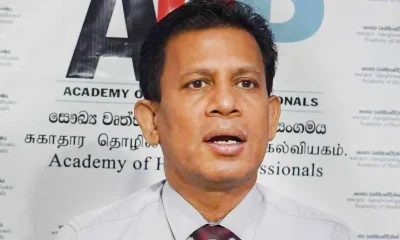
 News7 days ago
News7 days agoSuspension of Indian drug part of cover-up by NMRA: Academy of Health Professionals
-

 Sports5 days ago
Sports5 days agoChief selector’s remarks disappointing says Mickey Arthur
-

 News4 days ago
News4 days agoStreet vendors banned from Kandy City
-

 Editorial7 days ago
Editorial7 days agoA very sad day for the rule of law
-

 News7 days ago
News7 days agoUS Ambassador to Sri Lanka among 29 career diplomats recalled


